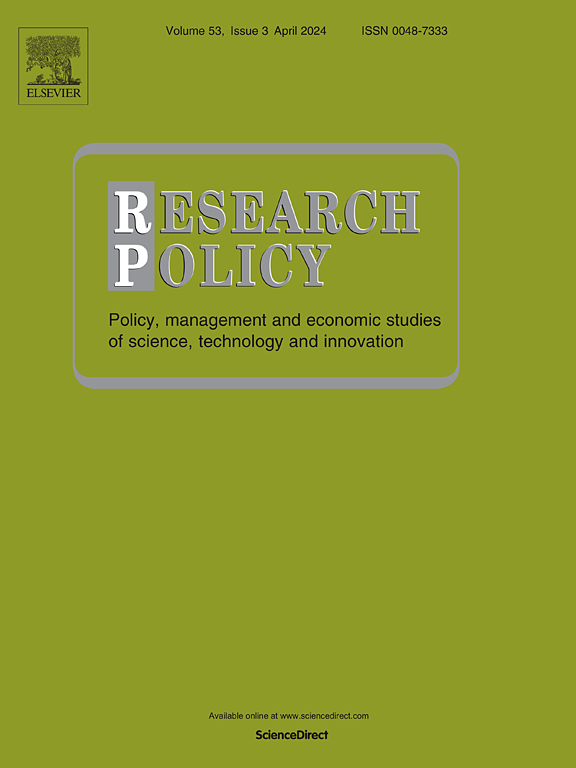Academic inbreeding and productivity of STEM early career researchers in different environments
IF 8
1区 管理学
Q1 MANAGEMENT
引用次数: 0
Abstract
Academic inbreeding at the individual level is a characteristic of a scholar's career, when they work in the same organisations where they studied. The phenomenon is usually associated with reduced quality of human capital, low circulation of knowledge and ineffective human capital allocation. However, there are a number of countries where academic inbreeding is widespread, but how it affects the research productivity of early career researchers has not been sufficiently explored. This article aims to specify the correlation between academic inbreeding and the individual productivity of early-career researchers within the system characterised by the high level of inbreeding. The study uses environments with different infrastructural and organisational conditions as moderators to clarify the peculiarities of the relationship. Based on data about 1132 early-career researchers in four fields of study it was found that the publication activity of inbred-researchers does not differ from that of their mobile counterparts at prestigious organisations or in regions having middle and small number of academic organisations. However, academic inbreeding negatively correlates with research productivity at universities without special status and in metropolitan regions. Thus, when the organisational environment provides a high quality of human capital for its graduates, the effect of academic inbreeding is mitigated. The same effect of inbreeding is observed in environments with poor choice of employers.
不同环境下STEM早期职业研究人员的学术近亲繁殖和生产力
在个人层面上,学术上的近亲繁殖是学者职业生涯的一个特征,因为他们在自己学习的同一家机构工作。这种现象通常与人力资本质量下降、知识流通缓慢和人力资本配置无效有关。然而,在一些国家,学术近亲繁殖很普遍,但它如何影响早期职业研究人员的研究效率却没有得到充分的探讨。本文旨在说明学术近亲繁殖与高水平近亲繁殖系统中早期职业研究人员的个人生产力之间的相关性。该研究使用具有不同基础设施和组织条件的环境作为调节因子来阐明这种关系的特殊性。基于对四个研究领域的1132名早期职业研究人员的数据,研究人员发现,近亲繁殖研究人员的发表活动与知名机构或拥有中小型学术机构的地区的流动研究人员的发表活动没有什么不同。然而,在地位不高的大学和首都圈,学术近亲繁殖与研究效率呈负相关。因此,当组织环境为其毕业生提供高质量的人力资本时,学术近亲繁殖的影响被缓解。在雇主选择不佳的环境中也观察到近亲繁殖的同样效果。
本文章由计算机程序翻译,如有差异,请以英文原文为准。
求助全文
约1分钟内获得全文
求助全文
来源期刊

Research Policy
MANAGEMENT-
CiteScore
12.80
自引率
6.90%
发文量
182
期刊介绍:
Research Policy (RP) articles explore the interaction between innovation, technology, or research, and economic, social, political, and organizational processes, both empirically and theoretically. All RP papers are expected to provide insights with implications for policy or management.
Research Policy (RP) is a multidisciplinary journal focused on analyzing, understanding, and effectively addressing the challenges posed by innovation, technology, R&D, and science. This includes activities related to knowledge creation, diffusion, acquisition, and exploitation in the form of new or improved products, processes, or services, across economic, policy, management, organizational, and environmental dimensions.
 求助内容:
求助内容: 应助结果提醒方式:
应助结果提醒方式:


